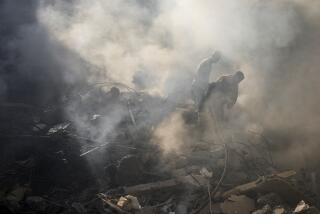U.N. Vote Urges Israel to Pull Out of Lebanon
- Share via
UNITED NATIONS — The U.N. Security Council, on a 14-0 vote with the United States abstaining, called Tuesday for the withdrawal of Israeli forces from southern Lebanon and the deployment of the embattled U.N. peacekeeping force along the border with Israel.
Israel had announced earlier that it would not comply with the resolution, which also calls on U.N. Secretary General Javier Perez de Cuellar to report back to the council in 21 days on its implementation. Ambassador Benjamin Netanyahu of Israel, although not a member of the 15-nation council, joined the debate to attack the French-sponsored resolution. He said the proposal failed to recognize the root problem--that the central government of Lebanon is unable to control the area.
Without the presence of Israeli forces and the Israeli-backed South Lebanon Army, the U.N. peacekeeping force would be subject to increasing attacks, Netanyahu said.
Since it withdrew most of its troops from Lebanon last year, Israel has maintained a so-called security zone, six to 10 miles wide, in southern Lebanon to protect its northern settlements from attack. The zone is patrolled by a limited number of Israeli troops and by the South Lebanon Army, an Israeli-backed, Christian-led Lebanese militia organization.
No Defense from U.N.
Netanyahu told the council, “We cannot and must not expect” the U.N. force “to defend Israel.”
Perez de Cuellar said in a report to the Security Council last Friday that the Israeli presence provoked retaliation from what he called “local armed elements” against the U.N. peacekeeping forces. Israel has blamed the attacks, which have resulted in five deaths in the U.N. force in the last two months, on the Shia Muslim organization known as Hezbollah (Party of God).
France has contributed 1,500 soldiers to the 5,800-man U.N. force, and of the most recent casualties, four of the dead and 33 of the injured were French.
Asked his reaction to the U.S. abstention after the vote, French Ambassador Claude de Kemoularia responded with a tight-lipped “no comment.” Other French diplomats, who spoke on condition that they not be identified, pointed out that Washington had consistently backed other resolutions dealing with the force, formally called the U.N. Interim Force in Lebanon (UNIFIL), since it was created in 1978.
U.S. Ambassador Vernon A. Walters, speaking in the council before the vote, acknowledged the past record of U.S. support of the U.N. force and said that “we continue to believe it plays an important role” in assuring eventual stability in the area.
U.S. Support for UNIFIL
“It is precisely because of our strong support for UNIFIL and its goals that we regret that we must abstain on this resolution put forward by a close friend and ally,” Walters said. “The problem in short is that the government of Lebanon, unfortunately, is not able to exercise its authority over the territory from which the attacks against UNIFIL are being launched.”
“If this problem cannot be solved in a short time frame, attention must then be directed to ameliorating the dangers of UNIFIL that flow from the lack of effective authority in Lebanon,” Walters said.
Lebanese Ambassador Rachid Fakhoury voiced “astonishment and regret” at the U.S. abstention and outside the council chamber told reporters that Washington’s action “had to do with Israel--when you mention Israel in any draft resolution, the United States automatically opposes it.”
Walters, asked why the United States had abstained although it had voted in the past for resolutions seeking the removal of all foreign troops from Lebanon, pointed out that “the situation in Lebanon has degraded considerably” since 1984, when Washington held hopes of retraining the Lebanese army to take control of the south.
Some members of the Security Council, speaking on condition that they not be identified, expressed surprise that Walters had not vetoed the resolution’s call for the withdrawal of Israeli troops. Mention of Israel has provoked U.S. vetoes in the past, but these diplomats pointed out that there was no condemnation of Israel in the text, only a condemnation of those who have attacked UNIFIL.
‘Local Mercenaries’
Council President Alexander M. Belonogov of the Soviet Union accused Israel of using “local mercenaries” to create a “so-called security zone” in southern Lebanon. Belonogov added that “council members know full well who is backing Israel and preventing council action. The recent attacks against UNIFIL can be shown to be the result of the irresponsible policy of connivance with the aggressor by Washington.”
Although De Kemoularia refused to comment on the abstention, he told reporters that he wished to deny press reports that French members of the U.N. force have been singled out for attack.
“It is only because we are the largest contingent that we have been attacked,” he said. “They are really attacking UNIFIL, thinking that if we withdraw, UNIFIL will collapse.”
More to Read
Sign up for Essential California
The most important California stories and recommendations in your inbox every morning.
You may occasionally receive promotional content from the Los Angeles Times.













